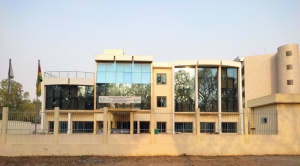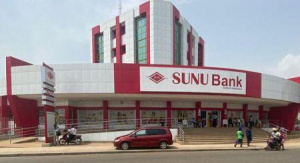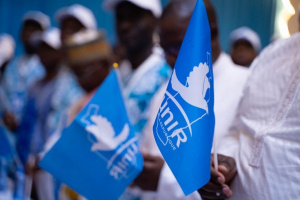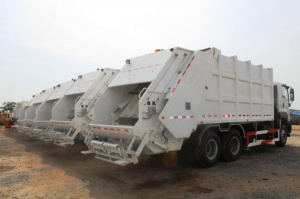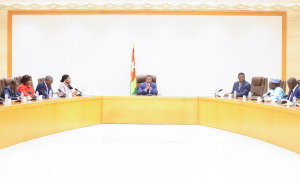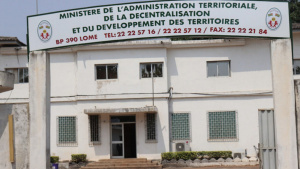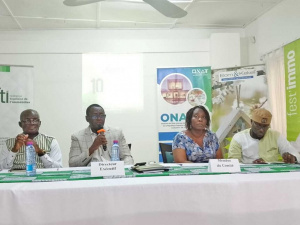Togo First
Togo: Intellectual Property Institute Launches Contest to Visually Rebrand
The Togolese Institute for Intellectual Property and Technology (INPIT) is visually rebranding. In this framework, it recently launched a national competition to have designers provide its future logo and graphic charter.
Backed by the Ministry of Industry and Investment Promotion, the initiative aims to modernize the institution's image and better reflect its strategic missions.
The competition is open to all Togolese citizens and closes on March 10, 2025. The goal is to capture the essence of industrial property protection, technological development, and innovation. Participants are instructed to avoid using the national coat of arms or other official symbols.
Created in 2001, the INPIT protects inventions, trademarks, and industrial designs in Togo. It represents the African Intellectual Property Organization (OAPI) and liaises with international bodies such as WIPO.
Ayi Renaud Dossavi
Togolese Filmmaker Angela Aquereburu to Head Benin's Public Broadcaster
Angela Aquereburu Rabatel, a Togolese media expert, is the new head of Benin's public broadcasting corporation, SRTB (Société de Radio et de Télévision du Bénin). The announcement came after a Council of Ministers meeting on Wednesday, February 12, 2025.
Known for her TV production skills and dedication to African content, Aquereburu Rabatel will also manage Benin's national television station, Bénin TV. She replaces Freddy Koudahoua and will be in charge of upgrading facilities, increasing viewership, and creating more diverse content to satisfy viewers.
In Togo, Aquereburu Rabatel is famous for producing successful shows, including the web series "Ahoé."
A director, producer, and writer, she has also worked on "Les Maternelles d'Afrique," the short film "L'Interrogatoire," and the series "Hospital IT" and "Oasis".
Ayi Renaud Dossavi
Agricultural Mechanization: BKG Distribution Secures €5M from Bank of Africa Togo
Bank of Africa (BOA) Togo has provided €5 million (about CFA3 billion) to BKG Distribution, which sells agricultural equipment. The funding, announced last week, is part of a partnership established in May 2023 to help Togolese farmers buy agricultural equipment with more ease.
Under the deal, BKG Distribution will provide farmers with equipment like combines and tractors without requiring upfront payments. Repayment terms come at competitive interest rates. The repayment will be flexible, extending over three years.
The agreement aims to address the financial challenges in the agricultural sector by facilitating equipment purchases. Bassirou Bonkoungou, CEO of BKG Distribution, said the system should enable farmers to get the equipment needed to increase productivity, removing usual investment bottlenecks. Youssef Ibrahimi, a top manager at BOA-Togo, described it as a fast and simple financing solution tailored to the country's agricultural sector.
BOA Togo also announced that discussions are underway to disburse another €10 million to BKG Distribution. The move supports Lomé’s ambition to modernize agriculture and make it a key part of economic development.
Agricultural mechanization is a key priority for Togo, with the recent creation of Regional Agricultural Mechanization Centers (CRMA) to improve equipment access and increase yields.
This article was initially published in French by Esaïe Edoh
Edited in English by Ola Schad Akinocho
SUNU Bank Togo: Branch Closures and Layoffs Planned to Tackle Financial Issues
SUNU Bank Togo, a subsidiary of the SUNU Group, is implementing a drastic restructuring plan to address ongoing financial difficulties. The plan includes branch closures, job cuts, and a tightly controlled recapitalization effort. These unfold amidst social tension and uncertainty.
When SUNU Group acquired Banque Populaire pour l'Épargne et du Crédit (BPEC) in 2017, the goal was to establish a foothold in the banking sector, building on its established reputation in insurance. However, eight years later, the Togolese subsidiary, the first banking establishment of the Group, is struggling and undergoing restructuring.
On February 3, 2025, the bank's management sent a letter to union representatives and the labor inspectorate outlining a reorganization plan. The plan includes closing seven unprofitable branches and cash points, cutting jobs, merging some activities, and redistributing staff.
The Union of employees and managers of banks, financial institutions, and insurance companies of Togo (Synbank), the employees union, rejected the bank's justifications. According to them, SUNU Bank Togo's financial problems stem from poor management, not excessive operating costs.
Fundamentals Scrutinized
However, the lender attributed its decisions to an urgent need to streamline costs and improve profitability. The cost/income ratio, a key indicator of banking performance, exceeded 90% between 2018 and 2023. Thus, for every franc earned, operating costs gulped 90 cents, well above industry standards of 50%-60%.
Between 2021 and 2022, the bank's situation worsened. In 2022, SUNU Bank Togo's fixed costs represented 96% of net banking income (NBI), compared to 98% in 2021. The bank indicated in a report that personnel costs further deteriorated SUNU Bank Togo's profitability between 2021 and 2022. In 2023, its cost/income ratio deteriorated further to 110%.
The bank believes its current level of expenses is incompatible with medium-term profitability. Key cost drivers include payroll and compensation practices deemed non-compliant, such as inadequate promotion systems, high vacation pay and cash bonuses, and overly generous internal credit terms for employees.
Accordion Effect
Another factor precipitating the restructuring was the revision of regulatory requirements. In December 2023, the UEMOA Banking Commission raised the minimum share capital for banks from 10 to CFA20 billion, forcing several institutions to strengthen their capital base[8].
SUNU Bank responded by launching a capital increase of CFA11.16 billion in December 2024. The operation, offering 2.48 million new shares at a unit price of CFA4,500, aimed to comply with new regulatory requirements and strengthen the bank's capital base.
The demons that SUNU Bank Togo deals with are not new. Since acquiring a stake in 2017, SUNU Investment Holding has made numerous balance sheet adjustments to stabilize the bank. An initial injection of CFA14.3 billion raised the share capital to CFA20.8 billion, completing BPEC's privatization.
However, in 2019, the group reversed course by reducing the capital by CFA11.4 billion, before increasing it again by just CFA1.8 billion, setting the capital at CFA11.16 billion. This decision was motivated by the need to absorb accumulated losses and restructure the financial base. The move reduced pressure on return on equity and strengthened the SUNU Group's control over the bank, increasing its shareholding from 65.7% to 71.64%.
SUNU Investment Holding intended to retain its majority control (71.64%) when the operation was launched in December 2024 and structured the offer to limit the entry of new independent investors.
More than a month after the close of subscription to the new capital increase, the bank has not disclosed the results.
Five years after the "coup d'accordéon," the establishment is still struggling to break even. On December 31, 2023, it posted a net loss of -CFA1.1 billion (down 319%), wiping out much of the profit made in recent years. Its solvency ratio, at 12.38%, remains slightly above the regulatory threshold of 11.5%.
Impasse
While management underscores restructuring to ensure the institution's long-term viability, Synbank views this as a smokescreen. The union and staff representatives firmly oppose the redundancy plan.
Discussions have been stalled for several months. On October 8, 2024, the Chairman of the Board of Directors met with union representatives for initial discussions. On January 10, 2025, senior management convened a further meeting, following the expiry of the statutory deadline stipulated in the collective agreement.
However, these negotiations failed to reach a consensus. The union is demanding an independent audit of the bank's accounts and the assent of the WAEMU Banking Commission before any negotiation. It is also rejecting the certified financial statements sent by management, arguing that they do not provide a complete picture of the difficulties raised.
In this context, management maintains that the restructuring process is "irreversible".
This article was initially published in French by Fiacre E. Kakpo
Edited in English by Ola Schad Akinocho
Togo: Ruling Party UNIR Wins First Senate Polls
Togo held its first-ever senatorial elections last Saturday, February 15. The ruling party, Union pour la République (UNIR), won the polls, securing 34 out of 41 seats. The Independent National Electoral Commission (CENI) disclosed the provisional results on February 14.
According to the source, the seven remaining seats were split among opposition parties and independents. The BATIR party won two seats, while the Alliance des Démocrates pour le Développement Intégral (ADDI) and the Union des Forces de Changement (UFC) took one seat, each. Three independent candidates won the last three seats.
The recent poll, a milestone in Togo, confirms UNIR’s dominance after its victories in legislative and regional elections in April 2024.
The Senate was created as part of constitutional reforms adopted on May 6, 2024, which shifted Togo to a parliamentary system. Under this system, the presidency is now mostly ceremonial, while executive powers are held by the President of the Council of Ministers (PCM), who must lead the majority party in Parliament. The Senate plays an important role in choosing the President of the Republic.
UNIR’s big win suggests that its leader will likely become Togo’s next President of the Council of Ministers.
This article was initially published in French by Esaïe Edoh
Edited in English by Ola Schad Akinocho
Togo: ANASAP to Restructure for Better Urban Sanitation
The National Sanitation and Public Health Agency of Togo (ANASAP) will soon an overhaul, which should help it handle its growing responsibilities better.
During its latest Council of Ministers on February 13, 2025, the government reviewed a draft decree to update ANASAP’s regulatory framework. Over a decade after its creation, the agency has shifted from being a consultancy and coordination body to taking on direct fieldwork, especially in Lomé, where sanitation challenges are significant.
The proposed changes aim to clarify the roles of ANASAP, local authorities, and the District Autonome du Grand Lomé (DAGL), which includes 13 municipalities. This restructuring is expected to improve public health efforts. Currently, ANASAP works on cleaning gutters, removing illegal dumpsites, creating green spaces, and maintaining roads. In recent years, it has also expanded its reach to other regions, opening a branch in Kara in 2023.
Togo Sets Up Funding Rules for Local Authorities in 2025
Lomé has established the rules for distributing the Fonds d'Appui aux Collectivités Territoriales (FACT) for the 2025 financial year. This program aims to support the new regional councils and ensure local authorities receive proper funding.
Approved by the Council of Ministers on February 13, 2025, the funding plan includes a basic amount and additional funds to help balance resource distribution. These extra funds will be allocated based on population size, land area, and poverty levels. The total budget for FACT has not yet been finalized.
According to the 2025 Finance Act, FACT’s budget is expected to increase by 42%, reaching CFA10 billion, up from CFA7 billion in 2024.
Focus on Operations and Investments
The funds, according to Minister of Communication Yawa Kouigan, will help regional councils pay for operational costs like employee salaries and councilor allowances. They will also support the creation of decentralized administrations.
Additionally, the funds will be used for important investments in areas such as local economic development, urban planning, sports, sanitation, and regional infrastructure.
“These investments will match the main responsibilities given to regions under decentralization,” Kouigan explained. Local authorities are also expected to add their funds to this budget.
Ayi Renaud Dossavi
Togo Advances Decentralization with New Administrative Conferences
Togo plans to create Regional Administrative Conferences (CAR) and Prefectural Administrative Conferences (CAP). The related project was reviewed during the Council of Ministers held on February 13, 2025.
These new bodies aim to improve coordination between the central government and local authorities, particularly in the regions. According to the Council of Ministers, CARs and CAPs will help align development policies and ensure stricter monitoring of government programs and projects.
Togo is divided into five regions led by governors. These regions are further split into 39 prefectures managed by prefects, and 117 communes run by mayors.
Esaïe Edoh
Togo Updates Tax Authority Framework to Boost Efficiency
The Togolese government is reforming the institutional framework of the Togolese Revenue Office (OTR) to align it with international standards. On February 13, 2025, the Council of Ministers adopted a bill to improve the governance and efficiency of the institution responsible for collecting tax and customs revenues.
The reform seeks to strengthen the OTR’s governance, optimize its Board’s operations, and streamline administrative procedures. According to the government, this initiative is part of broader efforts to modernize public administration and ensure transparency in mobilizing public resources.
The changes are guided by recommendations from a performance audit of the OTR covering 2014–2018. The audit suggested adopting international best practices to make the tax authority more efficient, improve revenue management, and simplify interactions with taxpayers.
“This initiative should help strengthen the country's attractiveness and consolidate its domestic resource mobilization policy,” stated the government.
Since its creation in 2014, the OTR has significantly increased tax revenues. From an initial collection of CFA458.2 billion in its first year, revenues grew by 116%, reaching CFA991 billion in 2023.
FESTIMMO: Togo's Premier Real Estate Event Returns for 10th Edition in May
Lomé will host the 10th Festival de l'Immobilier (FestImmo) from May 9 to 11. The Centre Togolais des Expositions et Foires (CETEF) Togo 2000 will host the major real estate fair.
Organizers announced the event at a press conference last week. FestImmo is a place where professionals, investors, and people looking to buy property can all meet.
“Real estate is an essential lever for economic development, and we must innovate, adapt our practices, and support all those who aspire to access housing or invest,” said Romuald Akitani, Head of FestImmo.
The fair will feature expert consultations, an exhibition of the latest innovations in the sector, conferences, and B2B meetings, among others.
The fair’s organizers expect 300 participating companies and 30,000 visitors.

